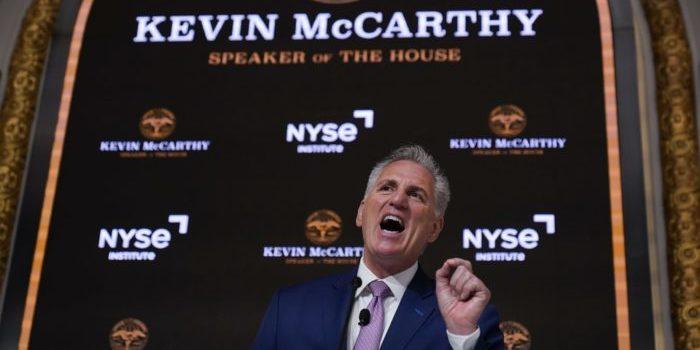(Headline USA) House Speaker Kevin McCarthy pledged on Monday to pass legislation to raise the nation’s debt ceiling—but only on condition of capping future federal spending increases at 1%—as he lashed out at President Joe Biden for refusing to engage in budget-cutting negotiations to prevent a debt crisis.
In a high-profile speech at the New York Stock Exchange, McCarthy, the Republican leader who was marking his 100th day as speaker, said the nation’s debt load is a “ticking time bomb” and Biden is “missing in action” as the deadline nears to raise the debt limit.
“Since the president continues to hide, House Republicans will take action,” McCarthy said.
On Monday, the White House hit back quickly at McCarthy, accusing the House leader of “dangerous economic hostage taking.” And administration officials reupped Biden’s pressure on the Republican leader to approve a debt ceiling increase with no strings attached.
McCarthy’s Wall Street address came with Washington heading toward a potential fiscal crisis over the need to raise the nation’s debt limit, now at $31 trillion, and avert a federal default.
“The longer President Biden waits to be sensible to find an agreement, the more likely it becomes that this administration will bumble into the first default in our nation’s history,” he said.
The Treasury Department has said it is taking “extraordinary measures” to continue paying its bills, but money will run short this summer.
While vowing that “defaulting on our debt is not an option,” McCarthy faces his own challenges pushing a legislative fix to passage.
With his slim majority and less-than-strong grip on power, he has been unable to rally his Republican troops around a budget-cutting proposal that he could offer the White House as a starting point in negotiations. The outline of conditions he proposed Monday is considered dead on arrival in the Democratic-controlled Senate.
McCarthy’s conditions were a “MAGA wish list that will increase costs for hard-working families,” claimed White House Deputy Press Secretary Andrew Bates.
“A speech isn’t a plan, but it did showcase House Republicans’ priorities,” said Bates.
And Senate Majority Leader Chuck Schumer said it’s McCarthy who “continues to bumble our country toward a catastrophic default.”
“President Biden and I are happy to meet with the speaker when he has something to talk about,” Schumer said. “He went all the way to Wall Street and gave us no more detail. No more facts, no new information at all.”
Nevertheless, McCarthy was both upbeat and defiant as he vowed to pass a bill through the House that would raise the nation’s debt limit into next year—putting the issue squarely in the 2024 presidential election—coupling it with a plan to roll back federal spending to fiscal 2022 levels and cap future spending at no more than 1% a year over the next decade.
Republicans, he said, also want to attach policy priorities, including imposing work requirements to recipients of government aid that would result in cuts to benefit programs in the federal safety net for poorer Americans.
And McCarthy said the House Republicans also want to tack on H.R. 1, an energy bill that would favor oil, gas and coal production—and ease permitting regulations imposed by the Biden administration that have contributed to the inflationary economy.
Many economists have suggested that it may take a stock market selloff to force an agreement, showing the risks of a possible default. But McCarthy said after his speech during a question period that he wasn’t gauging market reaction for guidance on the debt limit.
“The markets go up and down,” he said.
McCarthy is working furiously to unite the “five families”—the various caucuses including the Freedom Caucus, Republican Study Committee and others within the House Republican majority — around a plan that could be presented to Biden to kickstart negotiations.
Federal spending skyrocketed during the COVID-19 crisis, rising to $7.4 trillion in 2021, before easing slightly back to $6.2 trillion in fiscal 2022, according to Treasury Department data.
However, Biden’s spending spree on top of the COVID relief that was necessary to keep the economy open during pandemic shutdowns helped fuel unprecedented spikes in inflation, sometimes approaching double digits and continuing to inflict pain on average Americans.
The nation’s debt load has also climbed steadily, doubling during the George W. Bush administration with the 9/11-era wars overseas and spiking again during the Obama administration as spending rose and tax revenue plummeted during the Great Recession.
The nation runs more than $1 trillion in annual deficits, and the last time the federal budget balanced was 2001.
McCarthy noted that President Ronald Reagan similarly warned of government spending. The cuts the House Republicans want to make are not “draconian,” McCarthy said.
He pledged not to touch the Medicare and Social Security programs important to older Americans that other Republicans want to cut.
Once, his speech was interrupted by applause from the executives and others at the stock exchange.
The White House and Democrats in Congress have been unwilling to engage in talks with the Republicans, saying Congress must simply raise the debt limit without conditions.
Biden in particular, has been here before as vice president during the 2011 fiscal standoff that sent jitters through the economy.
The proposal from McCarthy will likely be too expansive for the White House to consider, but serves as a calling card to push Biden back to the negotiating table.
The split screen on display in New York, though, showed the challenges ahead for McCarthy in focusing on budget matters.
As the speaker delivered his speech, his hard-charging Judiciary Committee Chairman Jim Jordan was convening a New York City field hearing focused partly on District Attorney Alvin Bragg who indicted former President Trump on campaign finance and other charges related to alleged hush money payments.
Adapted from reporting by the Associated Press

